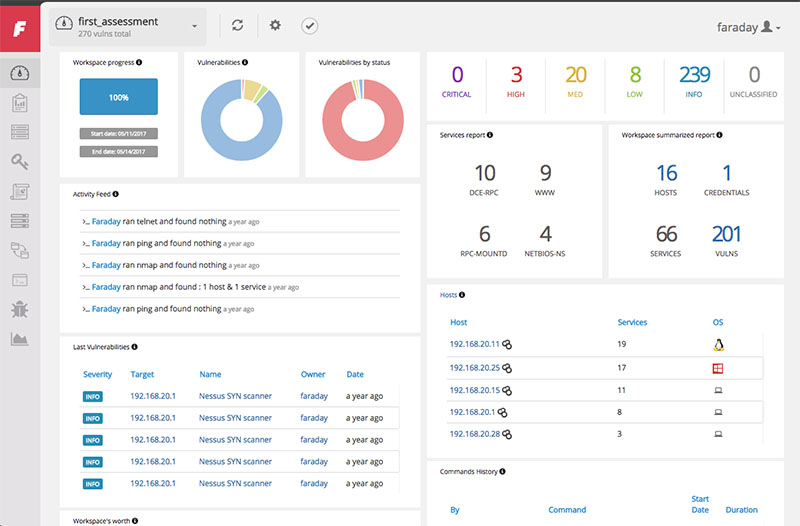Collaborative Pentest & Vulnerability Management Platform – [Faraday]
![Collaborative Pentest & Vulnerability Management Platform – [Faraday] Collaborative Pentest & Vulnerability Management Platform – [Faraday]](https://cdn.cyberpunk.rs/wp-content/uploads/2018/08/FARABACK.jpg)
Introduction
Faraday is a Collaborative Penetration Test & Vulnerability Management platform with a completely new concept – IPE (Integrated Penetration-Test Environment) a multiuser Penetration test IDE. This IDE platform is developed in Python by InfoByte.
Collaborative Penetration Test & Vulnerability Management Platform [Faraday]
Faraday is the Integrated Multiuser Risk Environment for distributing, indexing, and analyzing the data generated during a security audit (collaboration, penetration testing, security assessment, vulnerability scanning, etc.). Faraday platform provides different views such as management, executive summary, and also an overall issues list.
Requirements
Server
Faraday Server is the interface between PostgreSQL, Faraday Client and WebUI. Full list of Python requirements can be fing in requirements_server.txt file:
Client
Faraday Client works under any modern Linux distribution or Mac OS X. Requirements:
- Python 2.6.x or 2.7.x
- CouchDB >= 1.2.0
- GTK+3, PyGobject >= 3.12.0, Vte (API >= 2.90)
- Zsh
- Curl
For Python requirements check requirements.txt file.
Supported Platforms:
- ArchAssault, Archlinux, Debian, Kali, OSX, Ubuntu.
For more information and details on installation guide for each platform visit Faraday’s Wiki page.
Faraday Install
1 – Download
First of all, you need to download the latest tarball or clone the Faraday Git Project repository:
$ git clone https://github.com/infobyte/faraday.git faraday-dev $ cd faraday-dev
2 – Install system dependencies
Debian-based platforms (Debian, Backtrack,Ubuntu, etc.):
$ sudo apt update
$ sudo apt install build-essential ipython python-setuptools \
python-pip python-dev libssl-dev libffi-dev \
pkg-config libssl-dev libffi-dev libxml2-dev \
libxslt1-dev libfreetype6-dev libpng-dev postgresql
For different platforms check here.
In order to run the server, it is necessary to install Python modules using pip:
$ pip2 install -r requirements_server.txt -U
3 – Configure
To initialize Postgresql database, just run:
python manage.py initdb
By default, Faraday server will listen on port 5985. You can edit this on ~/.faraday/config/server.ini.
Note: If you are using Nginx and https, make sure you put this settings in yout nginx.conf file:
proxy_pass http://localhost:5985/;
proxy_redirect http:// $scheme://;
These are just the basic installation steps. For the complete documentation and installation guide, refer to the Faraday GitHub Project page.
Plugins
Available plugins for Faraday (Console, Report & API):
- Acunetix, Arachni, Burp, Core Impact, Maltego, Metasploit, Nessus, Netsparker, Nexpose, NexposeFull, Nikto, Nmap, Openvas, Qualysguard, Retina, W3af, X1, Zap.




